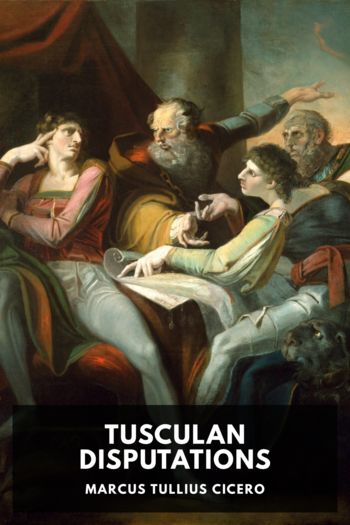Tusculan Disputations - Cicero (red novels TXT) 📗

- Author: Cicero
Book online «Tusculan Disputations - Cicero (red novels TXT) 📗». Author Cicero
But indeed, who can dispute the antiquity of philosophy either in fact or name? For it acquired this excellent name from the ancients, by the knowledge of the origin and causes of everything, both divine and human. Thus those seven Σόφοι, as they were considered and called by the Greeks, have always been esteemed and called wise men by us. And thus Lycurgus many ages before, in whose time, before the building of this city, Homer is said to have lived, as well as Ulysses and Nestor in the heroic ages, are all handed down to us by tradition as having really been what they were called, wise men. Nor would it have been said that Atlas supported the heavens, or that Prometheus was bound to Caucasus, nor would Cepheus, with his wife, his son-in-law, and his daughter have been enrolled among the constellations, but that their more than human knowledge of the heavenly bodies had transferred their names into an erroneous fable. From whence all who occupied themselves in the contemplation of nature were both considered and called wise men. And that name of theirs continued to the age of Pythagoras, who is reported to have gone to Phlius, as we find it stated by Heraclides Ponticus, a very learned man and a pupil of Plato, and to have discoursed very learnedly and copiously on certain subjects with Leon, prince of the Phliasii. And when Leon, admiring his ingenuity and eloquence, asked him what art he particularly professed, his answer was, that he was acquainted with no art, but that he was a philosopher. Leon, surprised at the novelty of the name, inquired what he meant by the name of philosopher, and in what philosophers differed from other men, on which Pythagoras replied, “That the life of man seemed to him to resemble those games which were celebrated with the greatest possible variety of sports and the general concourse of all Greece. For as in those games there were some persons whose object was glory and the honor of a crown, to be attained by the performance of bodily exercises, so others were led thither by the gain of buying and selling, and mere views of profit; but there was likewise one class of persons, and they were by far the best, whose aim was neither applause nor profit, but who came merely as spectators through curiosity, to observe what was done and to see in what manner things were carried on there. And thus, said he, we come from another life and nature unto this one, just as men come out of some other city to some much frequented mart—some being slaves to glory, others to money; and there are some few who, taking no account of anything else, earnestly look into the nature of things, and these men call themselves studious of wisdom, that is, philosophers. And as there it is the most reputable occupation of all to be a looker-on without making any acquisition, so in life, the contemplating things, and acquainting one’s self with them, greatly exceeds every other pursuit of life.”
Nor was Pythagoras the inventor only of the name, but he enlarged also the thing itself, and, when he came into Italy after this conversation at Phlius, he adorned that Greece, which is called Great Greece, both privately and publicly, with the most excellent institutions and arts. But of his school and system I shall, perhaps, find another opportunity to speak. But numbers and motions, and the beginning and end of all things, were the subjects of the ancient philosophy down to Socrates, who was a pupil of Archelaus, who had been the disciple of Anaxagoras. These made diligent inquiry into the magnitude of the stars, their distances, courses, and all that relates to the heavens. But Socrates was the first who brought down philosophy from the heavens, placed it in cities, introduced it into families, and obliged it to examine into life and morals and good and evil. And his different methods of discussing questions, together with the variety of his topics, and the greatness of his abilities, being immortalized by the memory and writings of Plato, gave rise to many sects of philosophers of different sentiments, of all which I have principally adhered to





Comments (0)